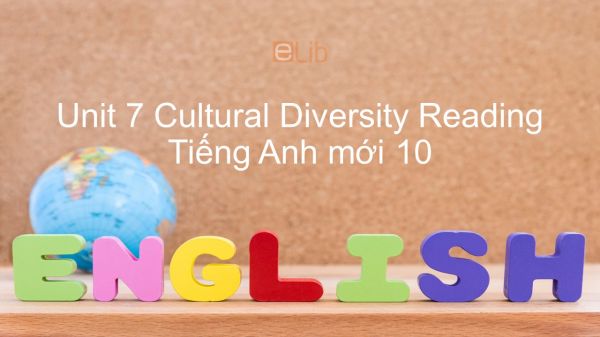Unit 7 lớp 10: Cultural Diversity - Reading
Bài học Unit 7 lớp 10 mới phần Reading hướng dẫn các em xây dựng từ vựng, đọc hiểu và trả lời về chủ đề "Mê tín dị đoan". Thông qua các dạng bài tập khác nhau, các em sẽ hiểu rõ hơn về chủ đề này. Mời các em cùng tham khảo!
Mục lục nội dung

Unit 7 lớp 10: Cultural Diversity - Reading
Are you superstitious? (Bạn có mê tín không?)
1. Task 1 Unit 7 lớp 10 Reading
Are the following statements true for you? (Những câu sau đây có đúng với em không?)
1. Before doing something important, I always choose a favourable time for it.
(Trước khi làm điều gì quan trọng tôi luôn chọn một thời điểm thích hợp để làm)
2. I never visit people's homes on the first day of the New Year unless they invite me.
(Tôi không bao giờ đến nhà ai chơi vào ngày đầu của năm mới trừ phi họ mời tôi)
3. I never sweep the floor during the first three days of the New Year.
(Tôi không bao giờ quét nhà trong 3 ngày đầu tiên của năm mới)
4. When I set out for an examination, I always try to avoid crossing the path of a woman.
(Khi tôi chuẩn bị cho một kỳ kiểm tra, tôi luôn tránh chạm mặt một người phụ nữ.)
5. On important days throughout the year I always lay food on the altar for my ancestors because I believe that they will enjoy the meal with my family.
(Vào những ngày quan trọng trong năm, tôi thường đặt thức ăn lên bàn thờ cho tổ tiên bởi vì tôi tin họ sẽ dùng bữa cùng gia đình tôi.)
2. Task 2 Unit 7 lớp 10 Reading
Read the text and answer the following questions by circling the best option A, B, C, or D. (Đọc bài văn và trả lời những câu hỏi sau bằng cách khoanh tròn sự lựa chọn đúng A, B, C hoặc D.)
Superstitions still play an important part of life for many people in Viet Nam. For example, a lot of people choose a favourable date for occasions such as weddings, funerals, or house moving days. Some people may argue that being superstitious has no place in today’s society. However, superstitions have existed in all human societies throughout history. As a country situated in Asia, where many mysteries, and legends originate, Viet Nam has also kept various superstitious beliefs about daily activities.
There are numerous rituals related to daily activities. During the Vietnamese New Year, for example, many people believe that the first person who visits their home on the first day of the new year will affect their life. Thus, they try to choose this person very carefully. If this person is rich, prestigious or happy, then the family will have good fortune that year. People also believe that if you sweep the floor during the first three days of the festival, you might sweep out any wealth. For other things, such as setting out for an examination or starting up a business venture, people will try to avoid crossing the path of a woman as this may not bring good luck to them. As for traditional beliefs, Vietnamese people strongly believe in life after death. They think that their ancestors have gone to live in another world. So, the altar is believed to be the place where the ancestors’ souls live in. That's why on many days of the year, people not only lay the table for meals, but they also lay food on the altar so their ancestors will join them for the meal.
1. What is true about Vietnamese society? (Điều gì đúng về xã hội Việt Nam?)
a. Only few people in Viet Nam are superstitious. (Chỉ rất ít người Việt Nam là mê tín)
b. People used to be superstitious in the past, but not now. (Mọi người từng mê tín trong quá khứ, nhưng bây giờ thì không.)
c. Superstitions are part of life for the majority of Vietnamese people. (Mê tín là một phần của cuộc sống đối với hầu hết người dân Việt Nam.)
d. All people in Viet Nam are superstitious. (mọi người ở Việt Nam đều mê tín)
2. How does the writer explain the origin of Vietnamese superstitions? (Tác giả giải thích nguồn gốc của mê tín ở Việt Nam như thế nào?)
a. They are based on scientific research. (Chúng được dựa trên các nghiên cứu khoa học.)
b. Viet Nam is located in part of the world where many mysteries and legends exist. (Việt Nam nằm ở vị trí trên thế giới nơi mà nhiều điều bí ẩn và giai thoại tồn tại)
c. Superstitions are beliefs about the supernatural. (Mê tín là là niềm tin đối với sức mạnh siêu nhiên)
d. These are government rules that everyone must follow. (Đó là luật mà chính phủ ban hành bắt mọi người phải tuân theo.)
3. Which of the following is mentioned as a superstitious belief? (Câu nào sau đây được đề cập là niềm tin mê tín?)
a. People don't care much about the first person who visits their home on the first day of the New Year. (Mọi người thường không quan tâm nhiều về người đầu tiên thăm nhà của họ vào ngày đầu năm mới)
b. People never choose the person who visits their house on the first day of the year. (Mọi người không bao giờ chọn người đến thăm nhà đầu tiên vào ngày đầu năm mới)
c. People believe that they will bring good fortune to their family if they work hard during the Tet holiday. (Mọi người tin là họ sẽ đem lại sự may mắn cho gia đình nếu họ lam việc chăm chỉ trong suốt ngày tết.)
d. People believe their first guest on the first day of the new year will affect the family prosperity for the whole year. (Mọi người tin là người khách đầu tiên vào năm mới sẽ tác động đến sự thịnh vượng cả năm)
4. Why do people lay food on the altar? (Tại sao người ta đặt thức ăn lên bàn thờ?)
a. They believe that their ancestors will enjoy the meal with them. (Họ tin là tổ tiên của họ sẽ ăn bữa cơm với họ)
b. The altar can be used as a table to lay food. (Bàn thờ có thể được sử dụng như là một cái bàn trưng bày đồ ăn)
c. They put the food there for later use. (Họ đặt thức ăn ở đó để ăn sau)
d. They don't know why they put it there. (Họ không biết tại sao.)
Guide to answer
1.c 2.b 3.d 4.a
Tạm dịch:
Mê tín vẫn đóng một vài trò quan trọng trong đời sống của nhiều người ở Việt Nam. Ví dụ, nhiều người chọn một ngày thích hợp cho đám cưới, đám tang, hay chuyển nhà. Vài người có thể tranh luận rằng việc mê tín không còn tồn tại trong xã hội ngày nay. Tuy nhiên, mê tín đã tồn tại trong tất cả xã hội loài người qua khắp các giai đoạn lịch sử. Vì là một quốc gia nằm ở châu Á, nơi sinh ra nhiều huyền thoại và truyền thuyết, Việt Nam cũng còn giữ nhiều niềm tin mê tín về những hoạt động hàng ngày.
Có những lễ nghi liên quan đến những hoạt động hàng ngày. Trong suốt năm mới ở Việt Xam, chẳng hạn, nhiều người tin rằng người đầu tiên xông nhà vào ngày đầu năm mới sẽ ảnh hưởng đến cuộc sống của họ. Vì vậy, họ cố gắng chọn người này rất cẩn thận. Nếu người này giàu, có uy tín hoặc vui vẻ, gia đình này sẽ có sự may mắn vào năm đó. Người ta tin rằng nếu bạn quét nhà trong 3 ngày đầu năm mới, bạn sẽ quét đi sự thịnh vượng của mình. Đối với những việc khác như chuẩn bị cho kỳ kiểm tra hoặc bắt đầu một công việc kinh doanh, người ta sẽ cố gắng tránh chạm mặt một người phụ nữ bởi vì điều này không mang đến may mắn cho họ. Đối với niềm tin truyền thống, người Việt Nam thật sự tin vào cuộc sống sau khi chết. Họ nghĩ rằng tổ tiên của họ đã đi đến sống ở một thế giới khác. Vì vậy, bàn thờ được tin tưởng là nơi mà linh hồn tổ tiên sống ở đó. Đó là lý do tại sao trong nhiều ngày trong năm, người ta không chỉ dọn bàn ăn cơm, mà họ cũng dọn thức ăn lên bàn thờ vì tổ tiên sẽ dừng bữa cùng họ.
3. Task 3 Unit 7 lớp 10 Reading
Discuss the following with a partner. (Thảo luận câu sau với người bạn.)
Are you a superstitious person? Why/Why not? (Bạn có phải là một người mê tín không? Tại sao?)
Guide to answer
Students' answers
4. Practice
4.1. Reading comprehension
Choose the letter A, B, C or D to complete the passage below
Check out these wild wedding traditions from around the globe.
The Blackening of the Bride: Scotland
The bride and groom are slathered from head ____________ (1) toe in every disgusting substance their friends can get their hands on. Curdled milk, rotten eggs, spoiled curry, fish sauces, mud, flour, sausages, every nasty thing you can imagine. As if that weren’t enough, the couple is then paraded about, with well-wishers making ____________ (2) much noise as possible. Depending on the region, sometimes it’s just the bride or groom alone ____________ (3) is the victim of this particular pre-wedding tradition.
Crying Ritual of the Tujia People: Sichaun Province, China
Starting 30 days before the wedding, the bride spends an hour a day ____________ (4). Ten days later, she is joined by her mother, and then ten days after that, her grandmother. I know what you’re thinking, ____________ (5) this is actually meant as an expression of joy and deep love.
Daur Chick Liver Tradition: Inner Mongolia, China
Time to get mystical. To select a wedding date, the young couple must take a knife and together slaughter a chick. The date is then divined by the appearance of the chick’s liver. If the liver has an unfortunate appearance, they must keep __________ (6) chicks until they find a good one.
Kumbh Vivah: India
Indian men and women born as Mangliks — meaning Mars is situated in the 1st, 2nd, 4th, 7th, 8th or 12th house of a person’s Rashi (Indian astrological moon sign) — are believed __________ (7). It is believed that Mangalik Dosha negatively impacts married life, causing tension and sometimes the untimely death of one of the partners. To cancel ___________ (8) effects, a Kumbh Vivah can be performed before the wedding. This is a wedding between a Mangalik and either a statue of Vishnu or a Peepal tree or banana tree. The celebrated Bollywood actress Aishwarya Rai had one such marriage with a tree before marrying her husband, Abhishek.
Bathroom Moratorium: Tidong community, Indonesia/ Malaysia
After the wedding, the bride and groom are not allowed to use the bathroom _________ (9) three whole days. They cannot leave the house, clear their bowels or urinate. The couple is watched over and are allowed minimal amounts of food and drink. ______________ (10) the custom is not practiced, they believe it will bring bad luck to the couple, with consequences such as a broken marriage, infidelity or death of their children.
Question 1: A. off B. to C. with D. for
Question 2: A. as B. like C. more D. most
Question 3: A. what B. when C. which D. who
Question 4: A. cry B. crying C. to cry D. cried
Question 5: A. but B. so C. and D. with
Question 6: A. killing B. kill C. killed D. to kill
Question 7: A. curse B. to be cursed C. be cursed D. cursing
Question 8: A. this B. that C. these D. those
Question 9: A. in B. for C. with D. of
Question 10: A. If B. When C. While D. Unless
4.2. Multiple-choice
Để rèn luyện kĩ năng đọc hiểu và nắm bắt từ vựng với chủ đề "Cultural Diversity", mời các em đến với phần luyện tập trắc nghiệm Unit 7 Reading Tiếng Anh 10 mới sau đây.
5. Conclusion
Qua bài học này các em cần đọc bài, làm bài tập đầy đủ và ghi nhớ các từ vựng sau:
- superstition /ˌsuːpəˈstɪʃn/(n): sự tín ngưỡng, mê tín
- soul /səʊl/(n) : linh hồn, tâm hồn
- prestigious /preˈstɪdʒəs/(adj): có uy tín, có thanh thế
- mystery /ˈmɪstri/ (n) : điều huyền bí, bí ẩn
- legend /ˈledʒənd/(n): truyền thuyết, truyện cổ tích
- funeral /ˈfjuːnərəl/ (n) : đám tang
- altar /ˈɔːltə(r)/(n): bàn thờ
Tham khảo thêm
- doc Unit 7 lớp 10: Cultural Diversity - Getting Started
- doc Unit 7 lớp 10: Cultural Diversity - Language
- doc Unit 7 lớp 10: Cultural Diversity - Speaking
- doc Unit 7 lớp 10: Cultural Diversity - Listening
- doc Unit 7 lớp 10: Cultural Diversity - Writing
- doc Unit 7 lớp 10: Cultural Diversity - Communication and Culture
- doc Unit 7 lớp 10: Cultural Diversity - Looking Back
- doc Unit 7 lớp 10: Cultural Diversity - Project




